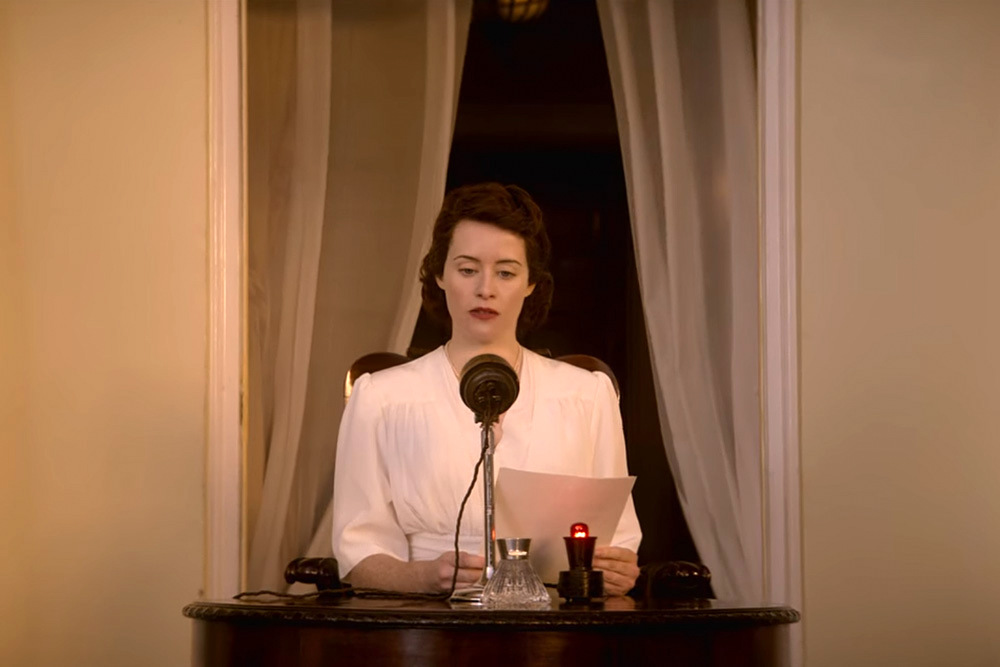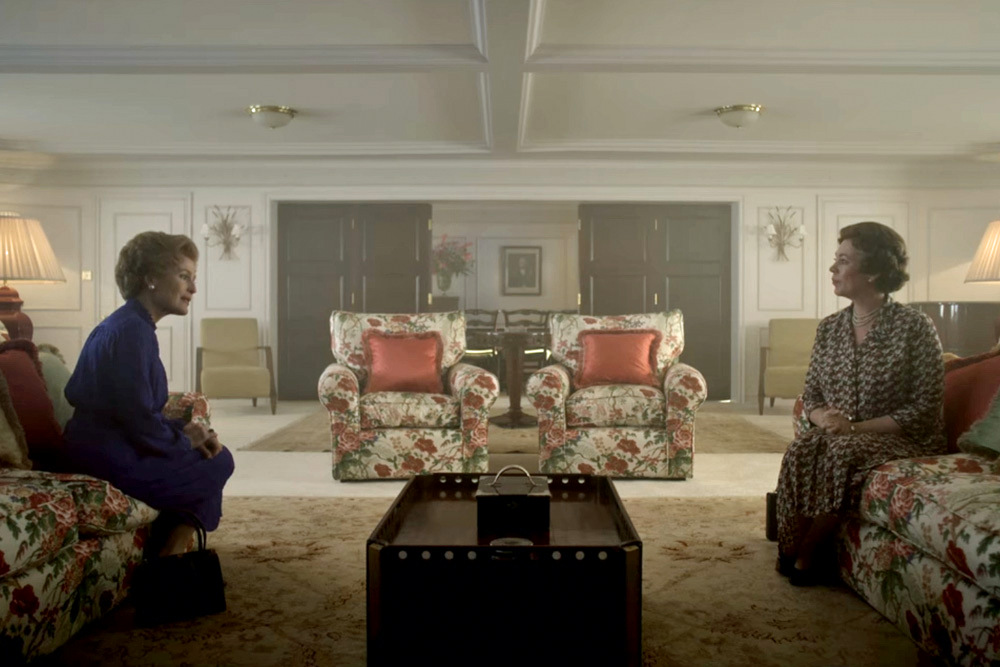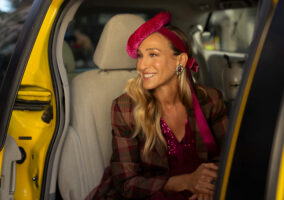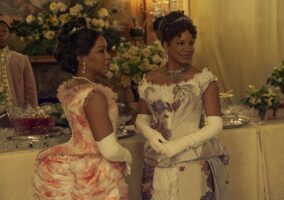
In “48:1,” the Queen and Margaret Thatcher come to blows, but only one of them comes away with a clearly stated case, and we’re not sure whether that was the intent of the script or not.
Claire Foy returns to the role to give Elizabeth’s famous 21st birthday speech from Cape Town, which sets up the coming conflict regarding South Africa, gives us glimpses of the commonwealth of nations, re-states the Queen’s concept of service and offers the show a chance to do a quick summary of Margaret Thatcher’s life and career. The series’ unusual approach to depicting the aging of its characters (it largely chooses not to and expects the audience to get on board) is strained quite a bit in this scene, since Foy is 36 and the digital smoothing of her face made it look a little mask-like, but it does give the show a nice sense of continuity to let former cast members back for flashbacks.
In the “present day” of 1985, Elizabeth is excitedly preparing for the Commonwealth Heads of Government meeting in Nassau and waving off Andrew, who’s come to creepily talk about their closeness and how it makes Charles jealous. Meanwhile, her press secretary is off trying to sell what sounded like a truly horrid manuscript to his literary agent. If this all sounds a little disjointed, that’s because it was. We’ve spent most of this season praising Peter Morgan for his ability to pull disparate events in history together, intertwine them with what we know about the personal histories of the royal family members, and come up with cohesive stories, but this is one time it just didn’t come together for us. Of all the episodes this season, this one’s been the hardest to review for that reason.

That difficulty or lack of cohesiveness may come down to the fact that the episode spent a good deal of time dramatizing the editing of a policy document on economic sanctions, which is a process that simply doesn’t lend itself to producing dramatic tension or cinematic moments. To be fair, the news reports about the Queen’s dissatisfaction with the Prime Minister regarding anti-Apartheid sanctions are well documented and were, in fact, inherently dramatic. But in trying to fill in the back story, Morgan came up with something a bit muddy and confusing. The script doesn’t really settle on a reason for the Queen’s actions. When her private secretary and her press secretary try to talk her out of expressing a public opinion on Thatcher’s opposition to imposing sanctions, she counters with “Would that really be so bad?” Both men, understandably, are complete flabbergasted by this turn of events. Indeed, the episode goes out of its way to show that literally everybody – from her children to her sister to all of her aides and allies – has no idea why, after three decades of total silence, this would be the moment that she violated the one principle she’s held most tightly to during her entire reign.
We suspect we’re supposed to take the Cape Town speech as the basis for her stance, as if The Queen had some lifelong affinity for South Africa, but this is not something the show has ever seen fit to depict before so it all feels like it’s coming out of left field. “You know how seriously I take my constitutional responsibility to remain silent but each of us has a line in the sand,” she says to her rightly confused courtiers, offering absolutely no explanation as to why this is her line in the sand. A radio newsreader is heard in the background at one point intoning, “What the palace hoped to achieve by this is hard to say,” which seems like the episode’s excuse for the vagueness, but if you’re going to devote an entire hour to the incident, you might want to come up with some sort of answer. The whole point to The Crown is to go behind the stories of history and spin stories of personal growth and conflict.
The episode only truly comes to life in the two confrontations between Thatcher and the Queen. Morgan has come in for a good deal of criticism for how he’s handled women characters on a show about one of the most famous women of all time, and we suspect several critics and reviewers will have issues with the way Elizabeth and Margaret’s relationship seems to come down to these sorts of catfight moments. It’s not for us to tell people how to feel about scenes like these, but we found their confrontations this episode to be kind of riveting. After all, we weren’t watching two women fight over a man or over who’s prettier. We saw them debating matters of worldwide importance, over which they both have considerable and unprecedented influence. In other words, it’s a shame that a few of these scenes come off a little deliciously confrontational in a soap opera sort of way, because what they were actually arguing about was worthy of debate and interesting to watch – and both Colman and Anderson did fantastic work in their scenes.

Morgan took the opportunity to imply racist intentions to Thatcher, having her voice fairly horrifying comments about “unreliable tribal leaders in eccentric costumes.” When Elizabeth expresses an affinity for the other commonwealth leaders and characterizes herself as yet another of those tribal leaders, Thatcher explains that it’s different because “You’re head of an evolved constitutional monarchy that stretches back to William the Conqueror.” Anderson’s Thatcher is an immovable object, not remotely cowed by the Queen’s position, even though she clearly respects her role. In their weekly audience after the news reports come out, Elizabeth tries to remain passive-agressive in her approach, which gives some indication of how ill-suited she is to the world of politics -especially Thatcher’s politics, which required a forced bluntness. The Queen attempts to wave off the reports as mere gossip and suggests they move on to other business. Thatcher, refusing to sit until this matter is given attention retorts “This is the business, ma’am. The only business.” While Morgan wants to imply that there’s a bit of racism and self-serving corruption (her son does business in South Africa) fueling Thatcher’s stance, he also – whether inadvertently or not – made her come off somewhat admirable in her resolve and her willingness to challenge the Queen’s authority in a way no other Prime Minister had the nerve to do. “Let us not forget,” she says, forcefully interrupting the Queen repeatedly, “that I am the one from a small street in an irrelevant town, with a father who could not bequeath me a title.” Elizabeth simply has no capacity to stand up to someone like Thatcher and the only response she can give is a weak and personal “Couldn’t you have supported me just this once?”
In the end, we are shown title cards with images of Nelson Mandela that inform us of the Queen’s moral rightness even as we watch scenes of a man getting scapegoated and fired for her actions, and … it just doesn’t work. We get that this was a confusing “hiccup” (as Thatcher put it) in the Queen’s history with her prime ministers, but it seems to us that if Morgan couldn’t come up with a good enough explanation for Elizabeth’s unprecedented actions, he might have reconsidered devoting an entire episode to them.
American Music Awards 2020 Red Carpet Rundown Next Post:
Alicia Vikander for Louis Vuitton Holiday 2020 Campaign
Please review our Community Guidelines before posting a comment. Thank you!



